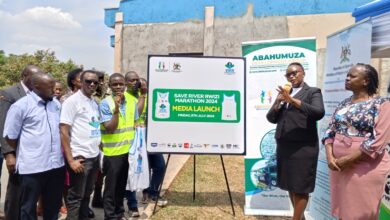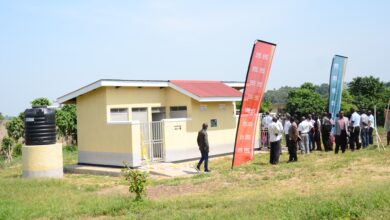Tooro King to install plasma screens in Fort Portal town to raise awareness on the HIV prevention
By Scovia Atuhaire

Fort Portal: In a bid to prevent and reduce the spread of HIV/Aids in Tooro sub region and the country at large, the King of Tooro Dr. Oyo Nyimba Kabamba Iguru Rukidi IV has endorsed the idea of installing plasma screens around Fort Portal town with prevention messages about HIV/Aids.
This was said by the Tooro Kingdom premier, Steven Kiyingi who said it’s the way people can receive important information.
“A lot has been done in the Kingdom to create awareness about the spread and prevention of HIV/Aids but a lot still needs to be done because instead of reducing it is increasing. The King has now thought of installing plasma screens displaying key messages on prevention” Kiyingi said.
Despite King Oyo being the UNAIDS ambassador in the fight against HIV/Aids, the prevalence rate is still very high in his Kingdom especially in Fort Portal city where the Kingdom headquarters are located.
On several occasions, the King has always called upon his subjects to desist from acts that can expose them to HIV/Aids and several health camps have been conducted and awareness messages delivered to the population.
A new report that was released last year by Uganda Aids Commission (UAC) shows that the transmission of HIV/Aids in Fort Portal city is increasing.
According to the report, the HIV/Aids prevalence rate in Fort Portal city stands at 17.8percent which if far above the national average of 5.1 percent.
This sparked concern among regional leaders and officials from the UAC.
An official at UAC western Uganda, Michael Masiko said joint efforts should be directed towards Fort Portal city to counter the rising infections.
“Unlike the past, when Kalangala district led in HIV/Aids prevalence, Fort Portal city now holds that unfortunate distinction. We are collaborating with Tooro sub region leaders to devise effective solutions” he said.
Dr.Richard Mugahi, the assistant commissioner in charge of reproductive and infant health in the ministry of health identified poverty, gender-based violence and limited male involvement in HIV testing as key factors driving high HIV prevalence.
“I advise the ministry of health to draft messages that reasonate with the current generation. For example fighting the scourge through social media” he said.
Despite the HIV/Aids prevalence rate remaining at 17.8 percent in Fort Portal city, there is an alarming trend of new infections being registered in women than in men.
Stakeholders stress that if this pattern is not addressed urgently, it could pose a significant burden on the city’s efforts to eradicate the scourge by 2030.
According to Evan Amara, the HIV/Aids focal person for Fort Portal city, the current number of people living with HIV/Aids is 20,848, of which 12,924 are women (62 percent) and 7,922 are men (38 percent) as of December last year.
She said between October and December last year, at least 237 new HIV/Aids cases were registered of which 100 were male and 137 were female from the 13 health facilities in the city.
Out of the 237 new infections, 27 were infections acquired within the past 12 months and 15 of them were among individuals aged 20 to 34, indicating a concerning trend of increasing infections among the youth.
Among the 13 health facilities accredited to offer HIV/Aids services, Fort Portal Regional Referral hospital caters for the highest number of people living with HIV/Aids, totaling to 8,134 individuals of which 5,134 are women and 3,001 are men.
The stakeholders blame the trend on women’s vulnerability and exposure, which they said places them at a highest risk of contracting the infection.
Rev. Sarah Kakyo from Ruwenzori Diocese attributed the rise in new infections to cross-generational sex.
“Some older men who are infected with HIV/Aids nowadays seek relationships with young girls seducing them with money. In turn, these young girls desiring quick money engage in relationships with these men and end up contracting the infection” Rev. Kakyo said.
The Fort Portal city deputy mayor, Betty Mujungu stressed the need for behavior change and addressing stereotypes in Tooro sub region.
“People have a misguided notion that Batooro people are inclined to have sex at an early age, which is incorrect and we condemn it. Its not in our culture. There are numerous stereotypes and public messages that need debunking because such misconceptions lead to the spread of HIV/Aids” she said.
She urged the Ministry of health to consider rebranding HIV/Aids messaging for the public, saying the current generation prefers receiving information through songs and drama rather than traditional radio talk shows.





After study a few of the blog posts on your website now, and I truly like your way of blogging. I bookmarked it to my bookmark website list and will be checking back soon. Pls check out my web site as well and let me know what you think.